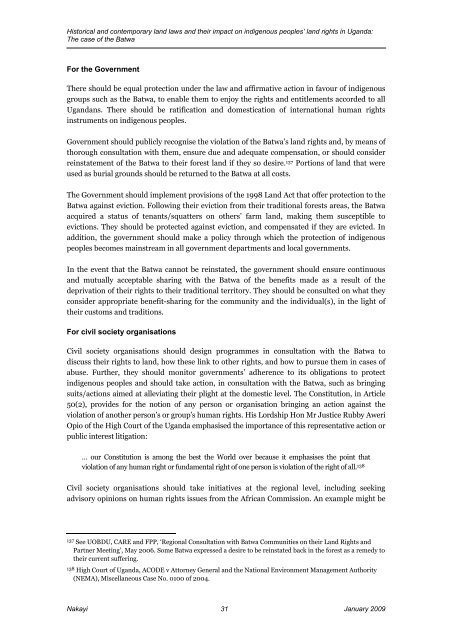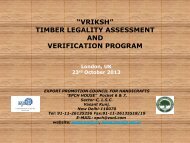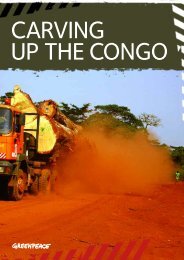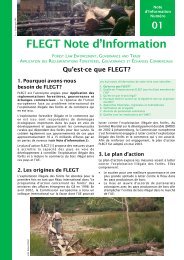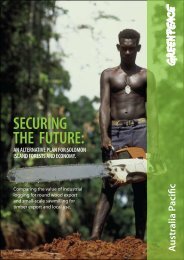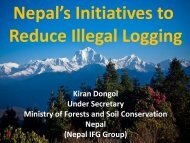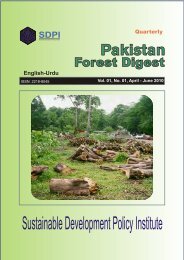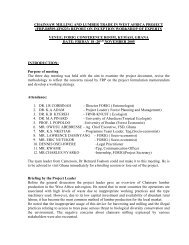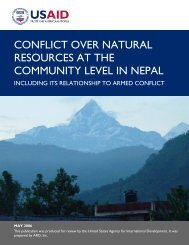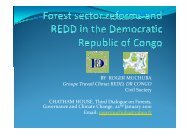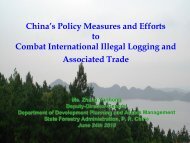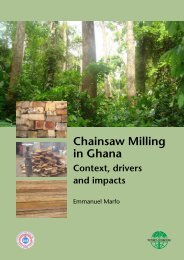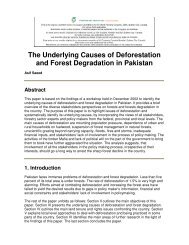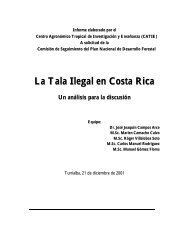download document - Rights and Resources Initiative
download document - Rights and Resources Initiative
download document - Rights and Resources Initiative
- No tags were found...
You also want an ePaper? Increase the reach of your titles
YUMPU automatically turns print PDFs into web optimized ePapers that Google loves.
Historical <strong>and</strong> contemporary l<strong>and</strong> laws <strong>and</strong> their impact on indigenous peoples’ l<strong>and</strong> rights in Ug<strong>and</strong>a:The case of the BatwaFor the GovernmentThere should be equal protection under the law <strong>and</strong> affirmative action in favour of indigenousgroups such as the Batwa, to enable them to enjoy the rights <strong>and</strong> entitlements accorded to allUg<strong>and</strong>ans. There should be ratification <strong>and</strong> domestication of international human rightsinstruments on indigenous peoples.Government should publicly recognise the violation of the Batwa’s l<strong>and</strong> rights <strong>and</strong>, by means ofthorough consultation with them, ensure due <strong>and</strong> adequate compensation, or should considerreinstatement of the Batwa to their forest l<strong>and</strong> if they so desire. 137 Portions of l<strong>and</strong> that wereused as burial grounds should be returned to the Batwa at all costs.The Government should implement provisions of the 1998 L<strong>and</strong> Act that offer protection to theBatwa against eviction. Following their eviction from their traditional forests areas, the Batwaacquired a status of tenants/squatters on others’ farm l<strong>and</strong>, making them susceptible toevictions. They should be protected against eviction, <strong>and</strong> compensated if they are evicted. Inaddition, the government should make a policy through which the protection of indigenouspeoples becomes mainstream in all government departments <strong>and</strong> local governments.In the event that the Batwa cannot be reinstated, the government should ensure continuous<strong>and</strong> mutually acceptable sharing with the Batwa of the benefits made as a result of thedeprivation of their rights to their traditional territory. They should be consulted on what theyconsider appropriate benefit-sharing for the community <strong>and</strong> the individual(s), in the light oftheir customs <strong>and</strong> traditions.For civil society organisationsCivil society organisations should design programmes in consultation with the Batwa todiscuss their rights to l<strong>and</strong>, how these link to other rights, <strong>and</strong> how to pursue them in cases ofabuse. Further, they should monitor governments’ adherence to its obligations to protectindigenous peoples <strong>and</strong> should take action, in consultation with the Batwa, such as bringingsuits/actions aimed at alleviating their plight at the domestic level. The Constitution, in Article50(2), provides for the notion of any person or organisation bringing an action against theviolation of another person’s or group’s human rights. His Lordship Hon Mr Justice Rubby AweriOpio of the High Court of the Ug<strong>and</strong>a emphasised the importance of this representative action orpublic interest litigation:… our Constitution is among the best the World over because it emphasises the point thatviolation of any human right or fundamental right of one person is violation of the right of all. 138Civil society organisations should take initiatives at the regional level, including seekingadvisory opinions on human rights issues from the African Commission. An example might be137 See UOBDU, CARE <strong>and</strong> FPP, ‘Regional Consultation with Batwa Communities on their L<strong>and</strong> <strong>Rights</strong> <strong>and</strong>Partner Meeting’, May 2006. Some Batwa expressed a desire to be reinstated back in the forest as a remedy totheir current suffering.138 High Court of Ug<strong>and</strong>a, ACODE v Attorney General <strong>and</strong> the National Environment Management Authority(NEMA), Miscellaneous Case No. 0100 of 2004.Nakayi 31January 2009


